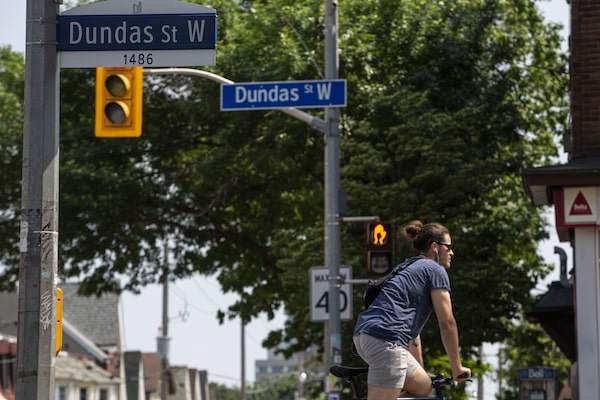
Toronto City Council voted in 2021 to rename the street after thousands of people signed a petition noting 18th century Scottish politician Henry Dundas's actions to delay the abolition of slavery.Giordano Ciampini/The Canadian Press
Three former Toronto mayors have asked the city to reconsider its decision to rename Dundas Street, questioning the “practicality” of the move and the research supporting it.
City council voted in 2021 to rename the street after a petition signed by thousands of people in the summer of 2020 noted the powerful 18th century Scottish politician Henry Dundas acted to delay the abolition of the slave trade.
In a letter circulated to the current mayor and council last week, Art Eggleton, David Crombie and John Sewell call Dundas a “committed abolitionist,” a view widely dismissed by historians on the subject.
Dundas, a key minister in the British government, amended a 1792 resolution to endorse gradual rather than immediate abolition of the slave trade. A city report, informed by staff interviews with 20 experts and a review of academic research, concludes his actions contributed to the perpetuation of enslavement.
The report says historians have suggested Dundas’s endorsement for gradual abolition was motivated by a fear of radical change, while others have said his position preserved British economic interests and military capabilities in the West Indies.
The former mayors suggest Dundas was “doing the best he could” under “challenging historical circumstances.”
“It appears that Henry Dundas … was a committed abolitionist who, when facing strong opposition and certain defeat, rather than give up his quest, advocated for interim measures that would ultimately lead to that result,” the letter read.
They note before he was a politician, Dundas represented Joseph Knight whose case affirmed the principle that any enslaved person could claim their freedom in Scotland, though historians have cautioned against taking a lawyers’ argument in court as representative of personal political beliefs.
The letter concludes by saying, “from a practical perspective,” there are “more appropriate ways to spend $8.6-million,” the latest estimate the city has provided for the renaming.
A statement from Toronto Mayor Olivia Chow’s office says she supports council’s 2021 decision, made in response to “community wishes.”
“We expect updated information including name options and updated cost estimates, to come back for city council consideration,” a statement from her office said.
The city has said it plans to release a short list of possible new names for the street this fall for public feedback. A community advisory committee will then pick the new name and present it to council, along with updated cost estimates, in early 2024.
The city has said a key component of the renaming is a transition plan to support residents and business. Staff, the city has said in a statement, have been directed to develop a cost recovery program for businesses related to renaming, such as changes to signage and branding.